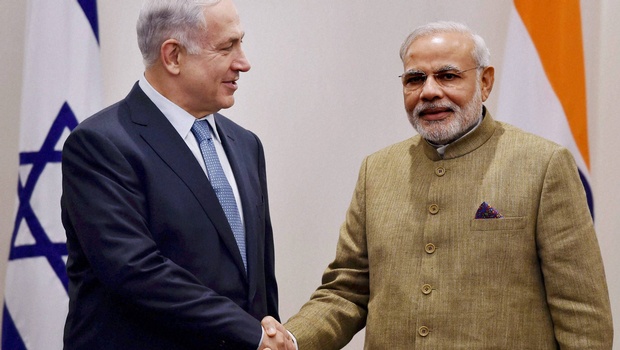By Soroor Ahmed, TwoCircles.net,
Diplomacy is not just about hype and hoopla as many of our television era journalists would like us to believe. It is a serious business and there is little scope for theatrics. Sometimes too much publicity and media-hype harms the larger cause of the nation.
Very often low-profile diplomacy works far more effectively than a high-profile attempt. For example, Ariel Sharon is the only Prime Minister of the Jewish state to visit New Delhi. On our part, while no Indian Prime Minister has ever visited Israel, (then foreign ministers) Jaswant Singh and S M Krishna have visited that country. Yet Israel is currently the fourth largest supplier of arms to our country.

File photo of PM Narendra Modi with Israel’s PM Benjamin Netanyahu at a meeting in New York.
Israel was quick to come to India’s assistance with an airlift of howitzer tanks during the Kargil war. Further, Israel and India are cooperating in various fields, for instance, counter-terrorism, intelligence sharing, drip irrigation, arms supply, military training etc with media paying little attention.
(But) there are hardly any panel discussions on TV channels and/or edit page write-ups on our relationship with Israel, as we witnessed during recent meetings of the Indian premier with the leaders of Japan, China and the United States. In fact, even the Narendra Modi-Benjamin Netanyahu meeting in New York last month did not get as much attention.
According to the latest figures, the US leads the weapons sales to India with $5.3 billion, followed by Russia ($4.14 billion) and France ($1.96 billion). Israel’s arms sales over the past three years totalled Rs 338.9 trillion, equivalent to $553 million.
Moreover, as India still has huge Russian arms, Israel is helping in upgrading and modernizing them. Till the collapse of Soviet Union in the early 1990s, Russia was the main supplier of arms to India. Now Israel sells to India aerial defence systems, missiles, and spy planes, and upgrades old Russian tanks and aircraft used by the Indian military.
So much has been achieved in just over two decades of diplomatic relationship. The then Prime Minister Narasimha Rao took this initiative without any pomp and show. In many ways the ties with Israel are much more important than the promise of FDI from Japan and China. Needless to mention, the share of FDI in our GDP is just two per cent. True, to counter-balance China, the US and Japan are strategically important to us, but so is Israel.
An example of ‘much publicity and media-hype harms the larger cause’ was when Israeli defence minister Ehud Barak sought to visit DefExpo exhibition at New Delhi in March 2012 to symbolize close Israel-India relationship, the then Indian defence minister AK Antony turned down the request as he wanted to keep low-profile, the security ties with Israel. India took this decision notwithstanding the fact that Israeli pavilion was the largest at the exhibition and included close to 20 Israeli defence companies. Many representatives from Israel’s defence ministry and security industry attended the exhibition and displayed their products.
Diplomacy has preceded the birth of private television channels by thousands of years. So it would be wrong to dub those who speak less and give fewer bytes as failures in the field of statecraft as it has become a common practice. True, the appearance and body language of the leaders do matter, but that is not everything. After all, (Mahatma) Gandhi dressed simply, was less talkative and even less photogenic a leader. Yet, he surpassed all.
In the past, there was little scope for our Prime Ministers and ministers to go about giving interviews and bytes or literally play to the gallery of television audience. They would seldom deliver speeches on radio. Neither would their functions – in India or abroad – be telecast, that too live. They were not meant for that job, but for more serious business. Yet they won many a diplomatic battle.
Thanks to our hyper main-stream media, we have missed the wood for the trees.
(Soroor Ahmed is a Patna-based freelance journalist. He writes on political, social, national and international issues.)

